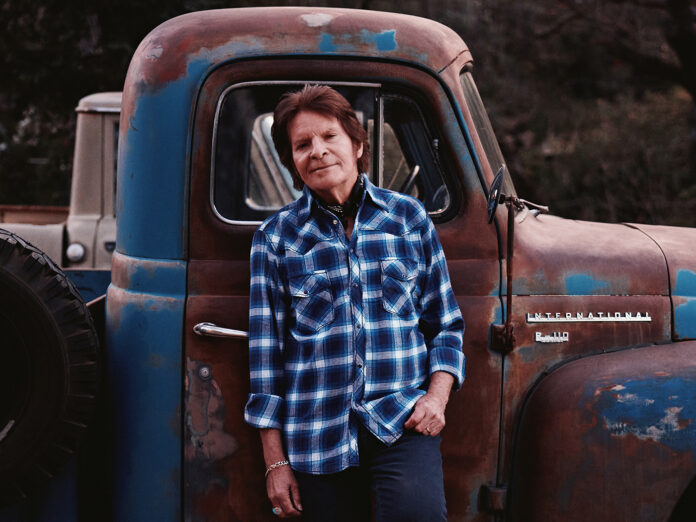Back in June of this year, US president Donald Trump ordered a parade in Washington DC in honour of the 250th birthday of the US Army – and, it was strongly suspected in certain quarters, of the 79th birthday of himself. At one point during what turned out to be a somewhat sullen and half-arsed trudge-past, the speakers blared the unmistakable descending riff of Creedence Clearwater Revival’s “Fortunate Son”.
Back in June of this year, US president Donald Trump ordered a parade in Washington DC in honour of the 250th birthday of the US Army – and, it was strongly suspected in certain quarters, of the 79th birthday of himself. At one point during what turned out to be a somewhat sullen and half-arsed trudge-past, the speakers blared the unmistakable descending riff of Creedence Clearwater Revival’s “Fortunate Son”.
This was either splendid mischief or atrocious ignorance on someone’s part. “Fortunate Son”, which first appeared on 1969’s Willy & The Poor Boys, was a none-too-subtle protest song decrying the ease with which the well-connected were able to help their heirs evade the Vietnam draft. But it also illustrated the extraordinary endurance of CCR’s catalogue. We are now further from the Tet Offensive than the Tet Offensive was from the Battle of the Somme, and “Fortunate Son” – and the other songs collected here – has barely aged at all.
Fogerty himself, of course, has: he turned 80 in May. You wouldn’t know it to hear him tearing through the hits one more time on Legacy. The decades since Fogerty first recorded these tracks have perhaps cost him some of the high top and low bottom ends of that distinctive half-drawl-half-snarl with which a California kid reinvented himself as some Southern swamp monster, but across “Legacy” he sounds generally in vigorous form, verging in parts on the downright feral, and he is surely entitled to what is as much a vindication as a celebration. Fogerty only recently acquired the rights to these songs: Legacy is his way of taking them back (in an obvious nod to Taylor Swift’s similar recent reclamation of her work, Legacy is subtitled “John’s Version”).
However, Legacy is hardly Fogerty’s first meander down memory lane. In 2013, he released Wrote A Song For Everyone, an entertaining enough album of CCR tracks recorded with an array of duet partners and guest stars (Foo Fighters, Dawes, Kid Rock, My Morning Jacket, among others). In 2020, he released Fogerty’s Factory, a 50th anniversary tribute to CCR’s “Cosmo’s Factory”, an album of CCR tunes recorded during Covid lockdowns with three of his children (Shane and Tyler Fogerty, both members of Dad’s touring band, also appear on Legacy).
Legacy differs from the abovementioned self-covers albums in that it is rigidly, doggedly faithful to the source material – Fogerty even deploys the same Rickenbacker Fireglo 325 he played on the original recordings (he gave the instrument away in the grips of despair after CCR’s famously rancorous split in 1972, but his wife Julie retrieved it as a Christmas gift in 2016). In fashioning Legacy, Fogerty and his collaborators separated the CCR tracks into their constituent parts to learn them, the better to recreate them as precisely as possible.
In this respect, mission accomplished. It’s all there, down to the “awwwwlllllright” which cues the guitar solo in “Bad Moon Rising”, or the strangulated “waaargh” which performs a similar role in “Travelin’ Band”, and it would be an unusually obsessive CCR fan who went 20 for 20 in correctly picking the new tracks from the old.
The question which inevitably arises is: however much fun this was for Fogerty and family and friends to make, when one considers the pronounced lack of anything wrong with the original CCR recordings, is there any reason for anyone else to listen to Legacy instead, or even as well as?
If there is a case for the affirmative, it may be “Lodi”. When Fogerty wrote this droll narration from the perspective of a washed-up club rocker stranded in some one-horse dump in the back end of nowhere, he was 23 years old, and leading one of the most popular bands on Earth through one of the most astonishing runs of commercial and critical success ever enjoyed by anyone (CCR’s seven studio albums appeared in just under four frantic years). Slightly more than half a century on, having endured his share of knocks, Fogerty is perhaps better able to inhabit what was always (at least) a middle-aged man’s reckoning with the consequences of his delusions – but you still wouldn’t want to try living on the difference between this and the original.
Possibly, the ambition is that Legacy, and the brouhaha attending its release, will attract far more interest from younger generations than yet another best-of would have. It can only be hoped so: CCR’s songbook still serves as a masterclass in the primal economy of great rock’n’roll, every thump, throb and twang doing as much as is necessary, and no more.



